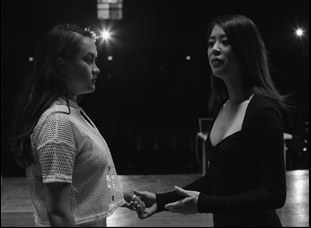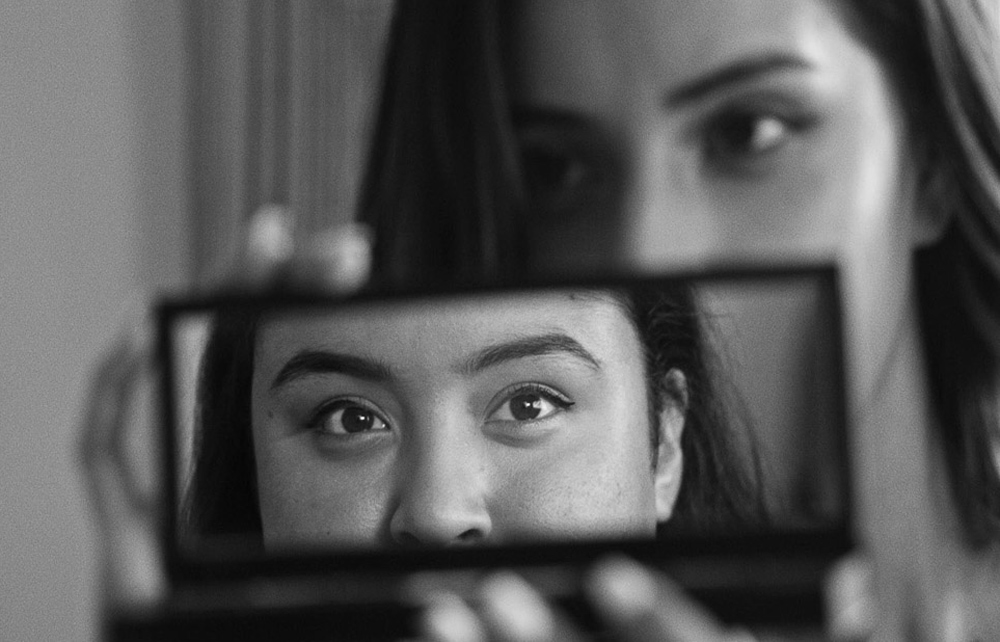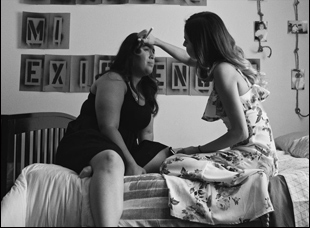When Patricia Vidal Delgado was studying at UCLA, she took a Latin American history course where the professor showed “Crossing Borders: The Journey of Carlos Fuentes,” a biographical documentary about the famed Mexican writer who had long been controversial within the country he came from for promoting what some believed were antiquated notions of history and culture that played into long-held stereotypes for those abroad.
“Speaking to some of my American classmates, one or two were like, “Oh yeah, yeah. They showed that to us in high school,’ so I think that this is something that has been kicking around in the American education system for a while,” says Delgado, who hails originally from Portugal.
The video shows up in “La Leyenda Negra,” but rather than continue a cycle, Delgado’s use of it in her feature debut aims to break it when it’s shown in class at Compton High where Aleteia (Monica Betancourt) has recently transferred and watches in disdain. In spite of a teacher insisting on its authority by saying, “This is an award-winning film from the Smithsonian,” the senior knows better, with her uncertain immigration status long requiring her to be politically engaged and while cultivating an awareness has led to strong enough grades to get into UCLA in the fall, it has also caused some trouble outside the classroom where she can be seen spending evenings tagging institutions she feels are working against her.
Unfortunately, Aleteia has no obvious recourse against the most formidable institution of them all when the Temporary Protected Status offered by U.S. Citizenship and Immigration Services for Salvadorans such as herself is on its way to ending shortly before she’ll enroll at UCLA, and while her father (Juan Reynoso) believes she’ll be exempt from deportation as a student, she heads into her final semester of high school stressed out for her future in ways that are far different than her classmates. At least, she finds a kindred spirit in Rosarito (Kailei Lopez), who has come to realize while she dresses like her well-to-do friends, she begins to grow apart from them, wondering what her identity is as she starts to understand what it isn’t. While reconciling the image others have of them with the one they have of themselves proves disorienting, Delgado’s lovely drama shows how Aleteia and Rosarito empathize with one another and perhaps show each other the way towards living without fear about who they are.
Shortly before the film’s premiere at the Sundance Film Festival, Delgado kindly spoke about putting together “La Leyenda Negra,” which draws its undeniable authenticity from utilizing real people and resources from in and around its Compton setting, and how the writer/director isn’t only broadening the perspectives that are presented on the big screen, but striving to elevate diverse new voices behind the camera as well.
I had written and directed a short film called “The Hood,” and I had worked with one of my friends who is a teacher at Compton High School, but who was also a professional actor, and he told me one day, “Oh, why don’t you come to Compton High and speak to my students? Because a lot of them are interested in being both in front of and behind the camera.” So I went to meet with his students and was really impressed by them. A lot of them are young Latinos who have immigration statuses that are currently under attack with this current administration, and [I thought of] started with this character of Aleteia, someone who is politically motivated and outspoken and someone who knows she is different, but isn’t ashamed about being different, which makes her a bit of a rarity among teenagers because she knows who she is.
What attracted you to the Salvadoran community in Los Angeles specifically?
Currently, there are about 10 countries that have the TPS status, which means that they can live and work in the United States, but Salvadorenos, essentially people from El Salvador, are the biggest percentage within that community that makes up about 417,000 immigrants, and that’s where the seed for the story was planted.
How did you go about filming at Compton High and involving some of the students and faculty?
We had to pay for permits and we had to go to the Compton Unified School District to formally ask for permission [to film at the school], but once we were granted permission, they were very, very generous and very supportive and allowed us to carry out our work in a safe environment.
The actors who were all beginners pretty much, apart from my friend Juan Reynoso, who played Aleteia’s stepfather, but all of them were first-timers and the rehearsal process was very, very intimate, very open. When there was room for improvisation within a scene, I’d absolutely give them free reign to do that and then would incorporate it back into the script. That’s something that harks back to neorealism and Fellini and Visconti, who were basically working with non-actors who were playing characters that were not too far removed from themselves, because there’s a rawness and an intensity that they can bring to a role that is something I really want to celebrate and showcase.
What sold you on your lead actresses?
In the case of Monica Betancourt, who played Aleteia, it was her strength because she’s 18 years old, so she was essentially playing someone the same age as her. but there’s something about Monica that she’s been through a lot in her personal life, but it hasn’t diminished her in any way. It’s made her even stronger and it’s given her such a powerful presence. And [with] Kailei Lopez, there’s something about her that she seems like she’s very soft-spoken and might be easily subdued or pushed around, but that’s very far from the reality because she also is someone that she stands up for herself, and that’s what Rosarito needed, is someone who looks like she’s going to be a bit of a wallflower, but underneath it all she’s just as strong as anyone else in the room. They also manage to have such an authentic bond with each other and they were able to convey that attraction and that sexual chemistry so well despite being very far from their own personal life.

It did. The film considers cycles of history, and it references colonialism, persecution of the other, intolerance, indifference, and it essentially asks the question tradition or change, so the idea to shoot in black and white stemmed from that French idiom, Bleu chassange.
Was there a particularly crazy day of shooting?
We shot in the summer, so we got some pretty bad heat waves and there was definitely one day when we shot the bus scenes, which was all one day, [where] there was no air conditioning on that bus, so that was particularly tough, and I remember we were scheduled to shoot the next day, a Sunday. And we had to reschedule the Sunday shoot because we got to the point where it’s like, “It’s not safe to work in these conditions and we have to protect our cast and crew.”
When it’s your first feature, was it any different than working on your shorts?
It definitely requires even more discipline, even more stamina, And even more communication. You just have to take each day as it comes, and after we wrap at the end of each day, [you have to] just very clearly keep in your mind, “Okay. Well, what is next?” That’s the difference between a short film and a feature. With a feature, you’re constantly just catching up with yourself, and then once you’ve done one day, [it’s like] “Well, we still got all the rest to go.”
Since this is our first time talking, how did you initially get interested in filmmaking?
I went to art school first in London, and when I was there I was, I was mainly doing video art, so it was new media work. Then when I graduated, there was a friend of mine who worked in film production who suggested, “Oh, why don’t you work as a camera assistant?” That’s when I started working on film sets and that’s when I really saw for myself that there is a bit of a problem with representation and also with diversity. I saw how rare it was to work with a female director or a female writer or even a female DP, and that was really when I was like, “I want to be part of the change.”
“La Leyenda Negra” will screen at the Sundance Film Festival on January 27th at 5:30 pm at the Egyptian Theatre in Park City, January 29th at 8:30 am at the MARC Theatre in Park City, January 30th at the Holiday Village Cinema 4 in Park City, January 31st at 9 pm at the Temple Theatre in Park City and February 1st at 3 pm at the Broadway Centre Cinema 6 in Salt Lake City.





